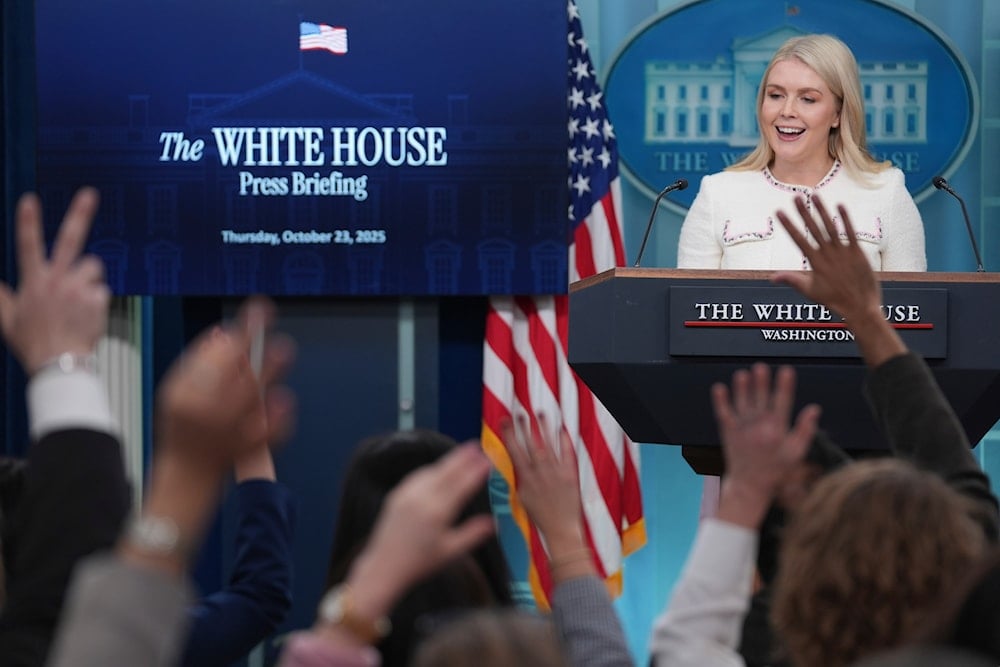WH moves to muzzle reporters in new crackdown on press freedom
The Trump administration faces criticism over new restrictions on White House press access, with journalists warning the measures reflect growing hostility toward independent media.
-

Reporters raise their hands to ask a question as White House Press Secretary Karoline Leavitt speaks during a press briefing at the White House, Thursday, Oct. 23, 2025, in Washington (AP)
The White House has imposed new restrictions on journalists’ access to parts of the West Wing, including the area housing Press Secretary Karoline Leavitt’s office, requiring reporters to schedule appointments before entering.
The move marks the latest in a series of measures aimed at tightening control over the press corps covering the administration.
Earlier this year, the White House removed the Associated Press from the daily pool rotation after the agency declined to update its style guide by renaming the Gulf of Mexico as the “Gulf of America.”
Following a legal challenge, the administration assumed control of pool arrangements from the White House Correspondents’ Association (WHCA) and now selects which media outlets are granted close coverage of President Donald Trump’s daily activities.
Pentagon adds to tensions with new media restrictions
Tensions between the administration and national media outlets have also intensified at the Pentagon. Defense Secretary Pete Hegseth recently instructed journalists to agree to new reporting limitations or risk losing their credentials to report full-time from the building.
Major US news organizations, including Bloomberg News, The New York Times, and five national television networks, refused to comply.
In a memo distributed to the White House press corps, Leavitt and Communications Director Steven Cheung justified the new access rules on national security grounds. They explained that White House communications personnel now operate closely with the National Security Council (NSC), often handling sensitive material.
“In order to protect such material, and maintain coordination between National Security Council Staff and White House Communications Staff, members of the press are no longer permitted to access Room 140 without prior approval in the form of an appointment with an authorized White House Staff Member,” Leavitt and Cheung wrote.
The restriction takes effect immediately and will significantly alter how journalists interact with senior communications officials who are directly attuned to President Trump’s thinking.
End of a longstanding tradition of press access
Until now, credentialed reporters were free to move from the briefing room to an area known as “Upper Press", where the offices of Leavitt and Cheung are located. This proximity allowed journalists to engage informally with senior aides, seeking real-time responses and clarifications on policy statements, especially those stemming from the president’s frequent social media posts.
That tradition of openness has spanned several administrations, including those of Joe Biden, Barack Obama, George W. Bush, and Trump’s first term. The space was briefly closed in the early years of Bill Clinton’s presidency but reopened soon after in an effort to rebuild trust with the press.
Under the new policy, reporters will retain access only to the lower-floor press offices near the briefing room, which are staffed by junior aides, according to Leavitt and Cheung.
Press Association condemns move as 'detrimental' to public accountability
The White House Correspondents’ Association sharply criticized the decision, warning that it undermines transparency and accountability.
“The White House Correspondents’ Association unequivocally opposes any effort to limit journalists from areas within the communications operations of the White House that have long been open for newsgathering, including the press secretary’s office,” WHCA President Weijia Jiang said in a statement.
“The new restrictions hinder the press corps’ ability to question officials, ensure transparency, and hold the government accountable, to the detriment of the American public,” Jiang added.

 4 Min Read
4 Min Read










